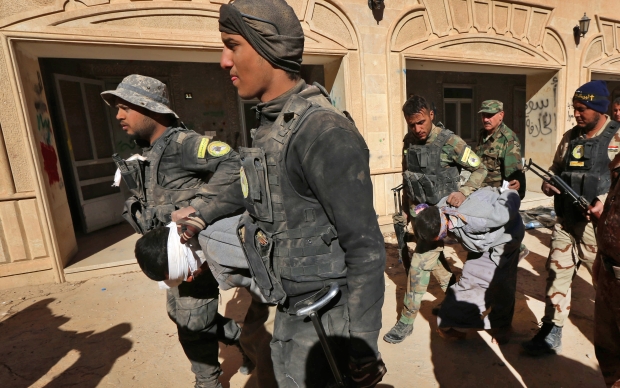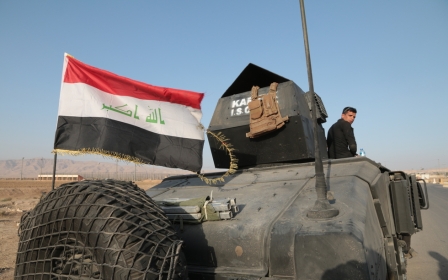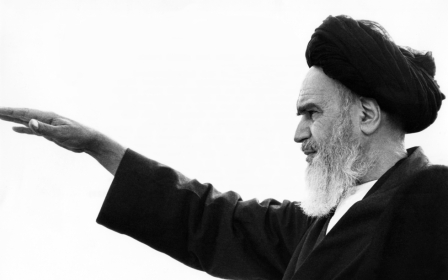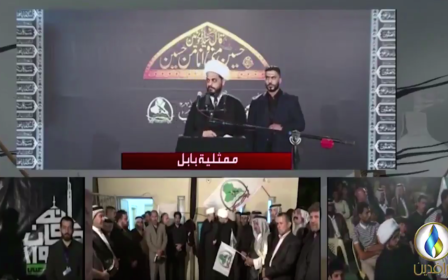Once they have defeated IS, Iraqi militias will not go away
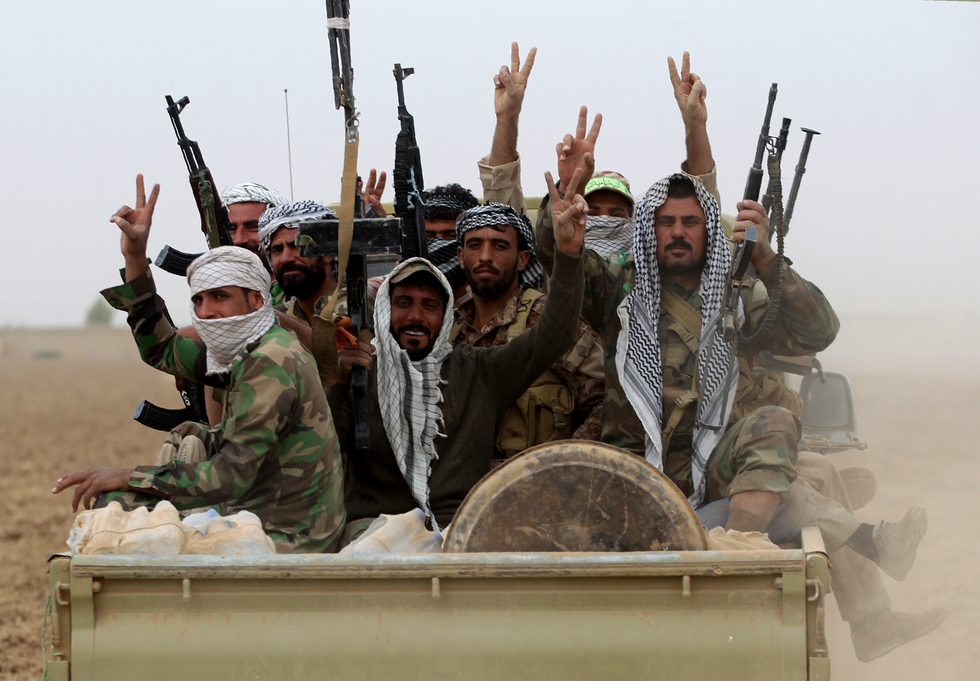
In June 2014, Grand Ayatollah Ayatollah Ali al-Sistani, the highest Shia authority in Iraq, announced a fatwa, or decree, calling on "citizens to defend the country, its people, the honour of its citizens, and its sacred places."
It was a call for jihad, and in the context of the Islamic State's rampage through Nineveh and Anbar provinces, a fledgling Iraqi army, and the jihadists' capture of the city of Mosul, many believe the militias formed after his call to be one of the few things that kept IS from reaching the capital of Baghdad.
It is certainly possible we could see a similar easing of tensions if the bulk of these militias are busy fighting abroad. Syria's disaster could be Iraq's saviour
The call to jihad was heard by millions, and as many as 100,000 took up arms to form the Hashd al-Shaabi (Popular Mobilisation Units), a coalition of largely Shia militias. But as necessary as their support has been to push back against the Islamic State, they now pose serious threats to the stability and integrity of a post-Islamic State Iraq, and indeed the wider region.
What will become of these militias? Encouraging thousands of young men to take up arms was the easy part. It is getting them to demobilise that is the serious and perhaps impossible challenge.
Early this month Akram al-Kaabi, leader of the al-Nujaba movement or Iraqi Hezbollah, was asked: "Will you give up your armed activity when the Iraqi lands are liberated from ISIS?" on Iraqi television. His response - "Our armed activity depends on whether there is or isn't a danger. We are not talking about whether ISIS is finished or concentrated on Iraq's border," makes it difficult to believe his men will lay down their weapons and go quietly.
Fighting in Syria
To add to the concern, Hadi al-Ameri, commander of the Badr organisation, the largest such militia, claimed that he had already received an invitation from Bashar Al-Assad to fight alongside the regime in Syria against the largely Sunni opposition.
The Iraqi militias already present in Syria are responsible for a litany of human rights abuses, and have played a critical role in rendering the conflict explicitly sectarian
The presence of Pakistani and Afghan militias in Syria has already been widely documented over the past few years, but as analyst Phillip Smyth asserted in The Times, "They [the regime] are using the Pakistani and Afghan militias as cannon fodder - but the Iraqis have the experience." Two years of fighting ISIS in hotspots like Fallujah and Ramadi have left them battle hardened, with the potential that they could tip the current stalemate in Syria in the regime's favour.
All that being said, as disastrous as the injection of further Shia militias into the ongoing conflicts in Syria and perhaps even Yemen would be, they could provide respite to Iraq. February 2015 saw the lifting of an 11-year night-time curfew in Baghdad, primarily as a result of so many of the troublesome militias being sent out of the city and to the north to fight. It is certainly possible we could see a similar easing of tensions if the bulk of these militias are busy fighting abroad. Syria’s disaster could be Iraq’s saviour.
Sectarian agenda
But in the wider context of the region, the Iraqi militias already present in Syria are responsible for a litany of human rights abuses, and have played a critical role in rendering the conflict explicitly sectarian – something which wasn't always the case. If there is one lesson that can be learned from Syria, it is that things can always get worse, and this would almost certainly be the case if Shia forces like al-Nujaba and the Badr organisation move en masse to Aleppo and Raqqa after Mosul.
If they do remain in Iraq one risk is that they become a tool with which those vying for power and influence can settle scores. Indeed Baqir Jabr al-Zubeidi, a former commander of the Badr brigades, and a senior member of the Islamic Supreme Council of Iraq (ISCI), has already threatened Kurdish forces in the town of Bashiqa, a majority Arab town to the east of Mosul liberated by the Peshmerga in recent weeks.
Such moves would not be without precedent. At the peak of his premiership in 2008, Prime Minister Nouri al-Maliki adopted the Iraqi army Sixth Division's Baghdad Brigade as a sort of "praetorian guard," effectively taking it out of the minister of defence's control. The damage caused by the effective rendering of this unit into an extremely well armed militia under Maliki’s personal control reached its apex in 2008 when forces raided the Diyala Governate offices to arrest the governor, Maliki rival Raad Rasheed Mullah Jawad.
A permanent presence
With threats already being voiced by the likes of Zubeidi, the risk that this becomes a primary purpose of some of the militias after the recapture of Mosul is real. Broadly speaking, there are three potential outcomes for Iraq's militias once the country is rid of the Islamic State. The first option would see the militias stay in Iraq, and risk becoming a permanent sectarian fixture in the country.
Option two, which could be described as something of a best-case scenario, sees them remaining in Iraq, disarming and somehow reintegrating into Iraqi society. On the balance of recent rhetoric, and the past histories of the major actors involved, this outcome is extremely unlikely.
Option three sees them sent abroad to fight in sectarian conflicts in Syria and Yemen, which whilst it may be favourable to Iraqi stability in the short term, would likely have far-reaching consequence for the rest of the region in the long term.
Of course, with such numbers, the militias should not be treated as one homogeneous organisation. What the Badr organisation do may differ from the al-Nujaba movement.
This considered, the most probable outcome is that some militias go abroad, and others take advantage of the frailty of the Iraqi government to increase their influence in Iraq. It must too be said that Iraq’s Shia militias make it difficult to give anything but a bleak prognosis for the country after IS is defeated.
- Gareth Browne is a journalist with an interest in current affairs, politics and the Middle East. His work has been featured in VICE, The Daily Mirror and Gulf News. @brownegareth
The views expressed in this article belong to the author and do not necessarily reflect the editorial policy of Middle East Eye.
Image: Shia fighters from the Hashed al-Shaabi (Popular Mobilisation Units) flash the sign for victory as they enter the village of Abu Shuwayhah, south of Mosul, on 1 November 2016, during the ongoing offensive to retake the last major Islamic State (IS) group stronghold in Iraq (AFP)
This article is available in French on Middle East Eye French edition.
Middle East Eye propose une couverture et une analyse indépendantes et incomparables du Moyen-Orient, de l’Afrique du Nord et d’autres régions du monde. Pour en savoir plus sur la reprise de ce contenu et les frais qui s’appliquent, veuillez remplir ce formulaire [en anglais]. Pour en savoir plus sur MEE, cliquez ici [en anglais].



